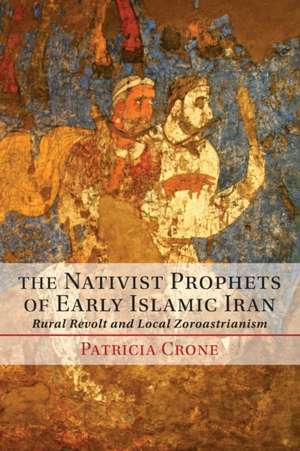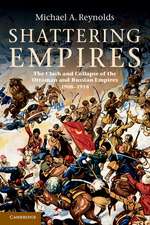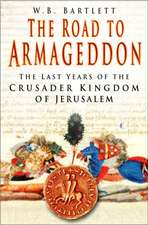The Nativist Prophets of Early Islamic Iran: Rural Revolt and Local Zoroastrianism
Autor Patricia Croneen Limba Engleză Paperback – 19 mar 2014
| Toate formatele și edițiile | Preț | Express |
|---|---|---|
| Paperback (1) | 215.55 lei 3-5 săpt. | |
| Cambridge University Press – 19 mar 2014 | 215.55 lei 3-5 săpt. | |
| Hardback (1) | 670.57 lei 6-8 săpt. | |
| Cambridge University Press – 27 iun 2012 | 670.57 lei 6-8 săpt. |
Preț: 215.55 lei
Nou
41.26€ • 42.91$ • 34.57£
Carte disponibilă
Livrare economică 20 februarie-06 martie
Specificații
ISBN-10: 1107642388
Pagini: 586
Ilustrații: maps (black and white)
Dimensiuni: 152 x 226 x 30 mm
Greutate: 0.79 kg
Editura: Cambridge University Press
Colecția Cambridge University Press
Locul publicării:New York, United States
Cuprins
Recenzii
'The Nativist Prophets of Early Islamic Iran is the story of an immense and mysterious landscape, intermittently rocked, throughout the late antique and early Islamic periods (effectively from around 250 to 850 AD), by detonations of religious fervor sparked by social unrest … The thrill of this book is that it brings the Iranian world into the mainstream of late antique history. Iran is seen as yet another participant in the religious and intellectual upheavals of the time.' The New York Review of Books
'One of Patricia Crone's achievements in her magnificent book on Iran in the aftermath of the Islamic conquest is to shed new light on sex on the Iranian plateau … using sources, besides Herodotus, that range from hostile Muslim missionaries to Buddhist pilgrims, she establishes that polyandry, the lending of wombs, and the renting of inseminators were not uncommon and that incestuous marriage was encouraged under Zoroastrian law.' Christopher de Bellaigue, Common Knowledge
'Crone's Nativist Prophets is a tour de force of data collection from primary sources and scholarly publications. It presents much fascinating information about localized discontents, specific beliefs, and marginal practices.' Jamsheed K. Choksy, Journal of the American Oriental Society
Descriere
Patricia Crone's book is about the Iranian response to the Muslim penetration of the Iranian countryside, the revolts subsequently triggered there and the religious communities that these revolts revealed. The book also describes a complex of religious ideas that, however varied in space and unstable over time, has demonstrated a remarkable persistence in Iran across a period of two millennia. The central thesis is that this complex of ideas has been endemic to the mountain population of Iran and occasionally become epidemic with major consequences for the country, most strikingly in the revolts examined here and in the rise of the Safavids who imposed Shi'ism on Iran.
This learned and engaging book by one of the most influential scholars of early Islamic history casts entirely new light on the nature of religion in pre-Islamic Iran and on the persistence of Iranian religious beliefs both outside and inside Islam after the Arab conquest.













